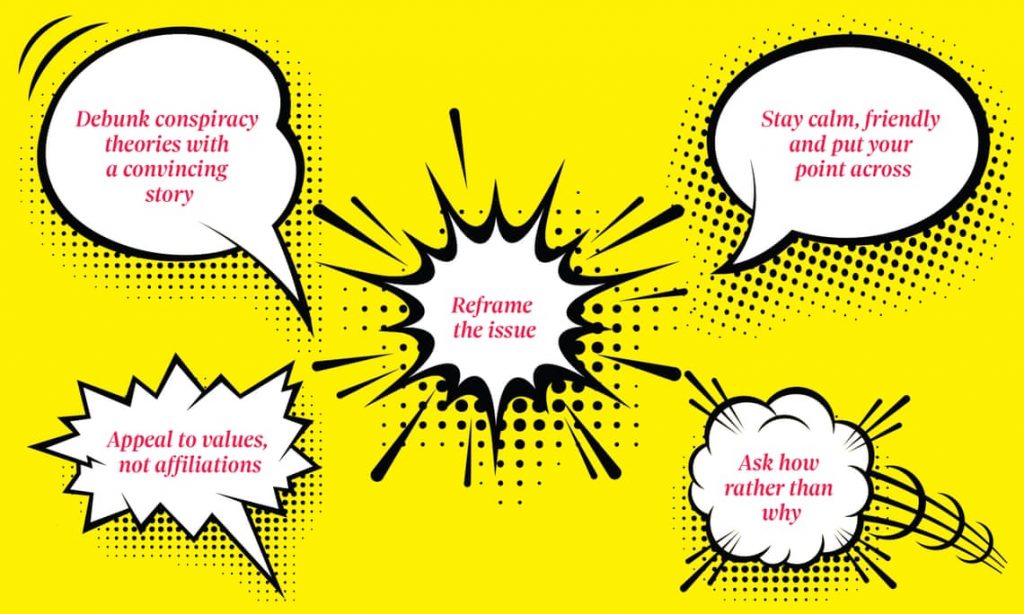https://www.theguardian.com/science/2019/jun/30/the-science-of-influencing-people-six-ways-to-win-an-argument

Hidebound views on subjects such as the climate crisis and Brexit are the norm – but the appliance of science may sway stubborn opinions
“I am quite sure now that often, very often, in matters of religion and politics a man’s reasoning powers are not above the monkey’s,” wrote Mark Twain.
Having written a book about our most common reasoning errors, I would argue that Twain was being rather uncharitable – to monkeys. Whether we are discussing Trump, Brexit, or the Tory leadership, we have all come across people who appear to have next to no understanding of world events – but who talk with the utmost confidence and conviction. And the latest psychological research can now help us to understand why.
Consider the “illusion of explanatory depth”. When asked about government policies and their consequences, most people believe that they could explain their workings in great detail. If put to the test, however, their explanations are vague and incoherent. The problem is that we confuse a shallow familiarity with general concepts for real, in-depth knowledge.
Besides being less substantial than we think, our knowledge is also highly selective: we conveniently remember facts that support our beliefs and forget others. When it comes to understanding the EU, for instance, Brexiters will know the overall costs of membership, while remainers will cite its numerous advantages. Although the overall level of knowledge is equal on both sides, there is little overlap in the details.
Simply asking why people support or oppose a policy is pointless. You need to ask how something works to have an effect
Politics can also scramble our critical thinking skills. Psychological studies show that people fail to notice the logical fallacies in an argument if the conclusion supports their viewpoint; if they are shown contrary evidence, however, they will be far more critical of the tiniest hole in the argument. This phenomenon is known as “motivated reasoning”.
A high standard of education doesn’t necessarily protect us from these flaws. Graduates, for instance, often overestimate their understanding of their degree subject: although they remember the general content, they have forgotten the details. “People confuse their current level of understanding with their peak knowledge,” Prof Matthew Fisher of Southern Methodist University in Dallas, Texas, says. That false sense of expertise can, in turn, lead them to feel that they have the licence to be more closed-minded in their political views – an attitude known as “earned dogmatism”.
Little wonder that discussions about politics can leave us feeling that we are banging our heads against a brick wall – even when talking to people we might otherwise respect. Fortunately, recent psychological research also offers evidence-based ways towards achieving more fruitful discussions.
Ask ‘how’ rather than ‘why’
Thanks to the illusion of explanatory depth, many political arguments will be based on false premises, spoken with great confidence but with a minimal understanding of the issues at hand. For this reason, a simple but powerful way of deflating someone’s argument is to ask for more detail. “You need to get the ‘other side’ focusing on how something would play itself out, in a step by step fashion”, says Prof Dan Johnson at Washington and Lee University in Lexington, Virginia. By revealing the shallowness of their existing knowledge, this prompts a more moderate and humble attitude.
In 2013, Prof Philip Fernbach at the University of Colorado, Boulder, and colleagues asked participants in cap-and-trade schemes – designed to limit companies’ carbon emissions – to describe in depth how they worked. Subjects initially took strongly polarised views but after the limits of their knowledge were exposed, their attitudes became more moderate and less biased. Advertisement
It’s important to note that simply asking why people supported or opposed the policy – without requiring them to explain how it works – had no effect, since those reasons could be shallower (“It helps the environment”) with little detail. You need to ask how something works to get the effect.
If you are debating the merits of a no-deal Brexit, you might ask someone to describe exactly how the UK’s international trade would change under WTO terms. If you are challenging a climate emergency denier, you might ask them to describe exactly how their alternative theories can explain the recent rise in temperatures. It’s a strategy that the broadcaster James O’Brien employs on his LBC talk show – to powerful effect.
Fill their knowledge gap with a convincing story
If you are trying to debunk a particular falsehood – like a conspiracy theory or fake news – you should make sure that your explanation offers a convincing, coherent narrative that fills all the gaps left in the other person’s understanding.
Consider the following experiment by Prof Brendan Nyhan of the University of Michigan and Prof Jason Reifler of the University of Exeter. Subjects read stories about a fictional senator allegedly under investigation for bribery who had subsequently resigned from his post. Written evidence – a letter from prosecutors confirming his innocence – did little to change the participants’ suspicions of his guilt. But when offered an alternative explanation for his resignation – to take on another role – participants changed their minds. The same can be seen in murder trials: people are more likely to accept someone’s innocence if another suspect has also been accused, since that fills the biggest gap in the story: whodunnit.
The persuasive power of well-constructed narratives means that it’s often useful to discuss the sources of misinformation, so that the person can understand why they were being misled in the first place. Anti-vaxxers, for instance, may believe a medical conspiracy to cover up the supposed dangers of vaccines. You are more likely to change minds if you replace that narrative with an equally cohesive and convincing story – such as Andrew Wakefield’s scientific fraud, and the fact that he was set to profit from his paper linking autism to MMR vaccines. Just stating the scientific evidence will not be as persuasive.
Reframe the issue
Each of our beliefs is deeply rooted in a much broader and more complex political ideology. Climate crisis denial, for instance, is now inextricably linked to beliefs in free trade, capitalism and the dangers of environmental regulation.
Attacking one issue may therefore threaten to unravel someone’s whole worldview – a feeling that triggers emotionally charged motivated reasoning. It is for this reason that highly educated Republicans in the US deny the overwhelming evidence.
You are not going to alter someone’s whole political ideology in one discussion, so a better strategy is to disentangle the issue at hand from their broader beliefs, or to explain how the facts can still be accommodated into their worldview. A free-market capitalist who denies global warming might be far more receptive to the evidence if you explain that the development of renewable energies could lead to technological breakthroughs and generate economic growth.
Appeal to an alternative identity
If the attempt to reframe the issue fails, you might have more success by appealing to another part of the person’s identity entirely.
Someone’s political affiliation will never completely define them, after all. Besides being a conservative or a socialist, a Brexiter or a remainer, we associate ourselves with other traits and values – things like our profession, or our role as a parent. We might see ourselves as a particularly honest person, or someone who is especially creative. “All people have multiple identities,” says Prof Jay Van Bavel at New York University, who studies the neuroscience of the “partisan brain”. “These identities can become active at any given time, depending on the circumstances.”
You are more likely to achieve your aims by arguing gently and kindly. You will also come across better to onlookers
It’s natural that when talking about politics, the salient identity will be our support for a particular party or movement. But when people are asked to first reflect on their other, nonpolitical values, they tend to become more objective in discussion on highly partisan issues, as they stop viewing facts through their ideological lens.
You could try to use this to your advantage during a heated conversation, with subtle flattery that appeals to another identity and its set of values; if you are talking to a science teacher, you might try to emphasise their capacity to appraise evidence even-handedly. The aim is to help them recognise that they can change their mind on certain issues while staying true to other important elements of their personality.
Persuade them to take an outside perspective
Another simple strategy to encourage a more detached and rational mindset is to ask your conversation partner to imagine the argument from the viewpoint of someone from another country. How, for example, would someone in Australia or Iceland view Boris Johnson as our new prime minister?
Prof Ethan Kross at the University of Michigan, and Prof Igor Grossmann at the University of Waterloo in Ontario, Canada, have shown that this strategy increases “psychological distance” from the issue at hand and cools emotionally charged reasoning so that you can see things more objectively. During the US presidential elections, for instance, their participants were asked to consider how someone in Iceland would view the candidates. They were subsequently more willing to accept the limits of their knowledge and to listen to alternative viewpoints; after the experiment, they were even more likely to join a bipartisan discussion group.
This is only one way to increase someone’s psychological distance, and there are many others. If you are considering policies with potentially long-term consequences, you could ask them to imagine viewing the situation through the eyes of someone in the future. However you do it, encouraging this shift in perspective should make your friend or relative more receptive to the facts you are presenting, rather than simply reacting with knee-jerk dismissals.
Be kind
Here’s a lesson that certain polemicists in the media might do well to remember – people are generally much more rational in their arguments, and more willing to own up to the limits of their knowledge and understanding, if they are treated with respect and compassion. Aggression, by contrast, leads them to feel that their identity is threatened, which in turn can make them closed-minded.
Assuming that the purpose of your argument is to change minds, rather than to signal your own superiority, you are much more likely to achieve your aims by arguing gently and kindly rather than belligerently, and affirming your respect for the person, even if you are telling them some hard truths. As a bonus, you will also come across better to onlookers. “There’s a lot of work showing that third-party observers always attribute high levels of competence when the person is conducting themselves with more civility,” says Dr Joe Vitriol, a psychologist at Lehigh University in Bethlehem, Pennsylvania. As Lady Mary Wortley Montagu put it in the 18th century: “Civility costs nothing and buys everything.”
• David Robson is the author of The Intelligence Trap: Why Smart People Do Stupid Things and How to Make Wiser Decisions (Hodder & Stoughton, £20). To order a copy go to guardianbookshop.com. Free UK p&p on all online orders over £15.



